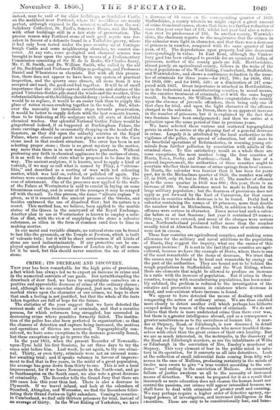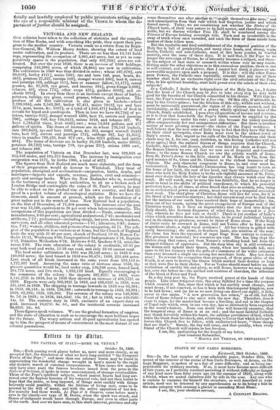CRIME; ITS DECREASE AND DISCOVERY.
THIS year has been remarkable for the high price of provisions, a fact which has always led us to expect an increase in crime and in the numerical contents of our gaols. But notwithstanding the drawback of dear food, we have to congratulate ourselves on a positive and appreciable decrease of crime of the ordinary classes ; and, although we are somewhat disposed, just now, to indulge in morbid views upon the character of our crimes, we hope to show that such a feeling is notjustified, but that the whole of the facts taken together are full of hope for the future.
The statistics of the year suggest that we have detected the cornet mode of the treatment of criminals and that a curative process, for which reformers long struggled, has succeeded in decreasing crime where penalties formerly failed. The institu- tion of the police has also been perfected in organization ; so that the chances of detection and capture being increased, the motives and operations of thieves are narrowed. Topographically con- sidered, we have some exceptions to the decrease generally found, but these exceptions only go to prbve the rule. In the year 1855, when the present Recorder of Newcastle- upon-Tyne held his first Sessions he sat three days to try the
eases sent before him. Last week, he sat again, to try one crimi- nal. Thirty, or even forty, criminals were not an unusual num- ber awaiting trial; and it speaks volumes in favour of improve- ment to find that in five years, in the midst of a great population, the average has gone down from thirty to one. This is not a local improvement, for if we leave Newcastle in the North-east, and go to Southampton on the South coast, we also note a great decrease of criminality. The Recorder tells the Grand Jury that there are 190 cases less this year than last. There is also a decrease in Plymouth. If we travel inland, and look at the calendars of Stamford, Abingdon and Worcester, we find the Recorders felici- titing their Grand juries on light calendars. Coming to counties: in Cumberland, we find only thirteen prisoners for trial, instead of an average of thirty. In the West Riding of Yorkshire, we have a decrease of 33 cases on the corresponding quarter of 1859. Staffordshire, a county wherein we might expect a great amount of crime from local causes, shows that there is a further reduction of cases this year over last of 131, whilst last year had also a reduc- tion over its predecessor of 181. In another county, Warwick- shire, the chairman reports to the magistrates that the crimes in the calendar were light in character, and that there was a decrease of prisoners in number, compared with the same quarter of last yeas, of 87. The depredations upon property had also decreased correspondingly in value. In East heat, although the Canter- bury gaol has been enlarged to provide for an occasional influx of prisoners, neither of the county gaols are full. Hertfordshire, almost purely an agricultural county, follows in the wake of the mixed populations of the West Ridiug, Cumberland, Staffordshire, and Warwickshire, and shows a continuous reduction in the num- ber of criminals for three years—for 1857, 786; for 1858, 694; for 1859, 600; and for 1860, 539; or a diminution of 247 com- pared with 1857. Great importance is attached in Hertfordshire, as in the industrial and manufacturing counties, to moral means, in the curative treatment of criminals, ar d with the same happy result. In Somerset, Sir William Miles congratulates the county- upon the absence of juvenile offenders, there being only one of that class for trial, and upon the light character of the offences charged in the calendar. In Devon, there is an apparent increase in the number of prisoners, but it is explained by the fact that two Sessions have been amalgamated ; and then we arrive at a reduction upon the same period of time in previous years. We have selected these various and scattered topographical points in order to arrive at the pleasing fact of a general decrease in crime. Largely it is attributed by the local authorities to the vigilance of the police, the spread of education, but still more to the beneficial operations of Reformatories, in rescuing young cri- minals from further pollution by association with adults of the criminal class. To this satisfactory result as a whole there are some exceptions, the most marked being the four counties of Hants, Essex, Derby, and Northuml.,rland. In the face of a general improvement, the authorities of these counties ought to ascertain whether their increase of crime spriugs from local causes. In Ilants, the calendar was heavier than it has been for years past, for in the Michaelmas quarter of 1838, the number was only 57, in 1859, only 48, but in 1860, it is 67. The number of offences up to the same quarter in 1839 was 860; this year, there is an increase of 100. Some allowance must be made to Hants for its large military population ; but the dearness of provisions does not apply as put forward by the Earl of Carnarvon, for that cause operates in counties where decrease is to be found. Derby had a calendar containing the names of 49 prisoners, more than double the number tried in Michaelmas, 1859, in addition to which the offences were serious in character. Essex never had such a calen- dar before as at last Sessions ; last year it contained 23 names ; this year, 46 were entered, and many of the charges were serious ones. Northumberland produced rather more than the number usually tried at Alnwick Sessions; but the cases of serious crimes were not in excess.
These four counties are agricultural counties, and making some allowance for the military and naval additions to the population of Hants, they suggest the inquiry, what are the causes of this apparent increase ? It is not in the fact that the counties are agri- cultural, because we have the example of Herts, where there is one of the most remarkable of the items of decrease. We trust that the causes may be found to be local and removable by energy on the part of the authorities. They are bound not to be behind the rough populations in Staffordshire and the West Riding, where there are elements that might be allowed to produce an increase in a ratio with the increase of population. But if crime in these counties, teeming with manufacturing populations, has been sensi- bly subdued, the problem is reduced to the investigation of the curative and preventive means in existence where decrease is noted, and non-existent where increase is found.
We appear to have detected the means of dealing with and conquering the action of ordinary crime. We are thus enabled more clearly to detect another evil which perhaps has hitherto escaped notice by reason of the number of criminals. We do not believe that there is more undetected crime than there ever was, but there is a greater intelligence abroad, and as a consequence a greater sensitiveness as to the sacredness of human life. .A mur- der at Stepney, Road, or Edinburgh, is now discussed in detail from day to day by tens of thousands who never troubled them- selves with other than the great crimes of their own locality. But we are as much interested, in the metropolis, in the discovery. of the Road and Edinburgh murders, as are the inhabitants of Wilts or Edinburgh in the conviction of Mrs. Emsley's murderer at Stepney. This very element of fear in the public mind is salu- tary in its operation, for it converts us all into detectives. Look at the collection of small inferential facts coming from fifty wit- nesses in the ease of Mullens, producing certainty in the minds of twelve men sworn to give "a true verdict according to the evi- dence" and ending in the conviction of Mullens. An occasional failure of justice awakens us all to the necessity of increased means of detection. We must be prepared for it as a result that inasmuch as mere education does not cleanse the human heart nor control the passions, our crimes will appear intensified because we shall have to deal with criminals of greater craft and cunning. We may perhaps require a higher order of detective agency, en- larged powers of investigation, and increased intelligence in the executive. These are only to be constitutionally had, and belie-
&hilly and lawfully employed by public prosecutors acting under the eye of a responsible minister of the Crown to whom the de- partment of justice should be assigned.



























 Previous page
Previous page